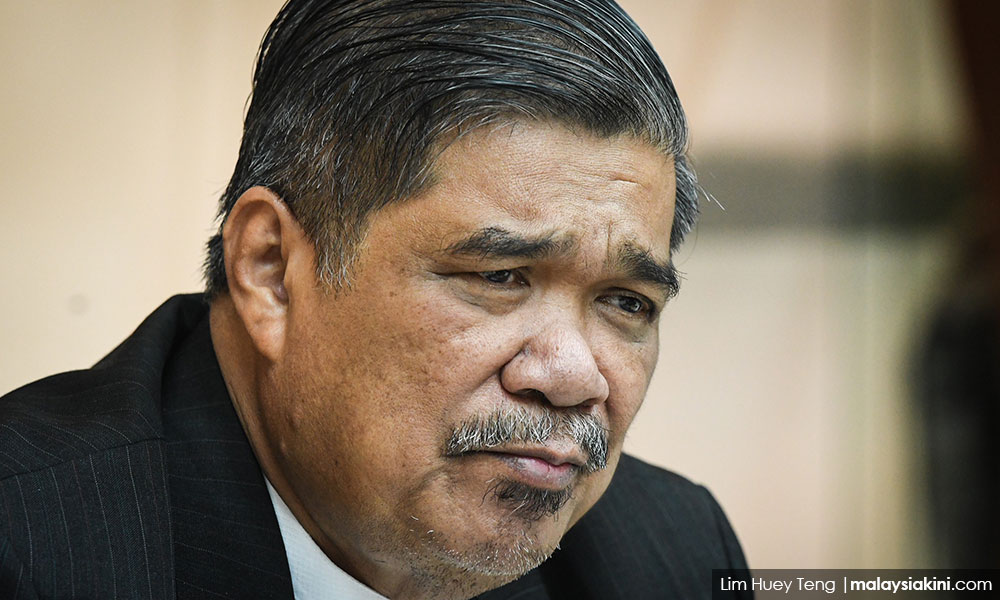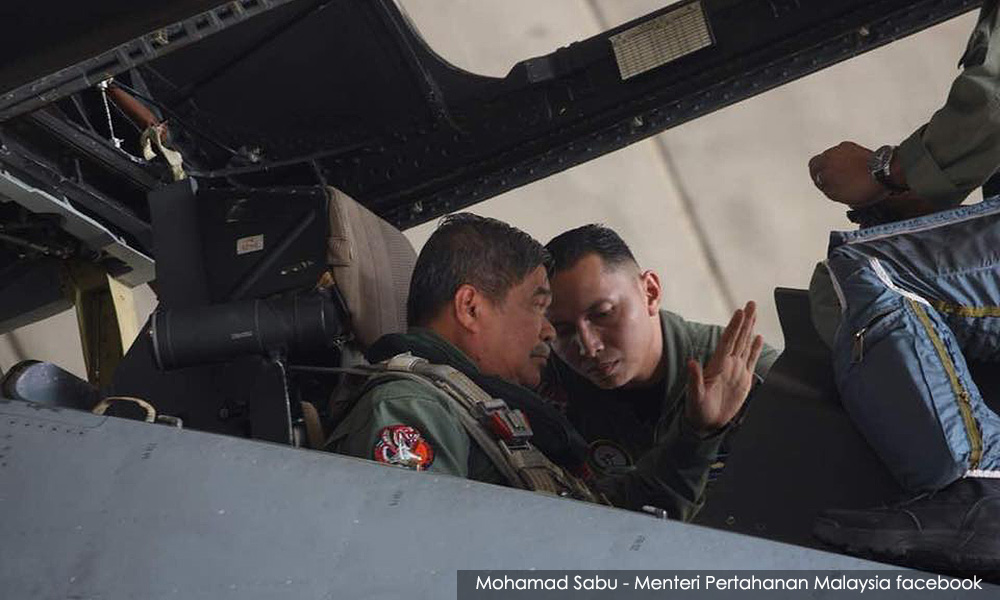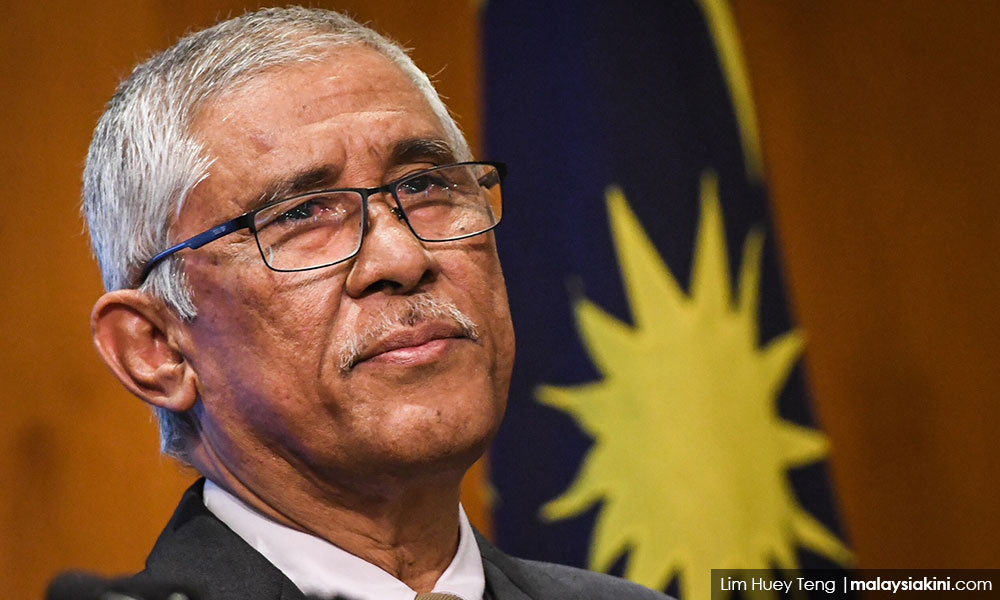
The defence minister, it goes without saying, must defend the sovereignty and security of the country. That much is obvious, even perfunctory.
Defence ministers must do what defence ministers do - protect and serve, in a manner not unlike the police, though with a bigger ambit to protect almost everything and everyone in Malaysia under the sky, and in the belly of the sea.
On certain occasions, our troops can also serve with the United Nations Command. We did so in Congo in the 1960s and again in Lebanon to keep people from going at each other's throats.
A recent news account in New Straits Times affirmed that several defence bloggers and military aficionados have criticised Defence Minister Mohamad Sabu's decision to be open and honest about the decrepit state of Malaysia’s defence assets - information which is widely known in Southeast Asia and East Asia anyway, since corruption has found its way into the marrows of the Malaysian government prior to the strategic electoral upset of May 9. It does make one wonder if these so-called "experts" are indeed specialists?
To begin with, honesty is the best policy in running a Defence Ministry, especially when one is coming from the quicksand of 1MDB, whose losses have easily reached an untraceable US$10 billion, if not higher.
Indeed, one hasn't even included the missing US$4.5 billion from the collection of the goods and services tax (GST).
Secondly, honesty has not led to any severe implication in the international marketplace too. Moody's, Standards and Poor’s and Fitch, to name but three, have not downgraded the ratings of Malaysia, despite its national debt and liabilities of US$250.9 billion.
Thus, if Finance Minister Lim Guan Eng can be open and candid about Malaysia's national debt, why shouldn't Mat Sabu - as Mohamad is popularly called - be the same?
SWOT analysis
By explaining to Parliament, which is a key branch of the government by the way, that only four Sukhoi fighter jets are air- and battle-worthy, while the other 14 are being grounded for repairs, Mat Sabu was doing his job. Indeed, Mat Sabu went one step further too.
He argued that he was determined to help Malaysia become a top country in the region (again), exceeding even Vietnam, when it came to defence-related issues. In other words, Mat Sabu was doing a partial SWOT (Strengths, Weaknesses, Opportunities, Threats) analysis in Parliament.
Mat Sabu, or, Abang Mat as he is better known to many Malaysians, was focused on the strengths and weaknesses of the Defence Ministry, or Mindef.
Now Mat Sabu did not focus on the objectives and threats faced by Malaysia, as to name an enemy would be to create an enemy in a self-fulfilling prophecy. Thus, in more ways than one, Mat Sabu has begun the process of helping Malaysia to situate itself correctly on any regional geopolitical issue, since staring at Malaysia is the issue of the security of the Straits of Malacca and the South China Sea.
Indeed, if Mat Sabu had explained the objectives and threats of Mindef all in the same breadth in Parliament, then the strategic acumen of neutrality would have been immediately lost too.
In any ancient martial arts philosophy, what Mat Sabu did was akin to declaratory deterrence, which in Malay would probably mean "Melayu (Malaysia Baru) pantangdicabar".

Therefore, while Malaysia's air force needs a quick reboot and revamp, Malaysia's other forces and special commandos remain ready to repel any acts of intimidation and terror.
In fact, true military experts continue to believe that Malaysia has one of the best fighting forces in jungle warfare. If not, the Malaysian government would not have defeated the Malayan Communist Party by 1960, leading to the latter’s peaceful surrender in 1989 under the Hatyai Peace Agreement, while other neighbouring countries were still struggling with their own insurgencies.
The corrosive effect of lying
Thirdly, one has to remember that Mat Sabu explained the strengths and weaknesses of Malaysia, comparing what the country had achieved in the 1970s, to what Malaysia under the previous administration had neglected, within the context of Parliament.
If the military analysts and enthusiasts affirmed by the New Straits Times had expected him to lie or be coy about the defence preparedness of Mindef, Mat Sabu would practically be asked to begin the whole process of lying, which, as 1MDB has shown, is totally corrosive.
Even security guards tasked with guarding the Prime Minister's Department allegedly ransacked the former prime minister’s office with a heist of nearly RM3.5 million ringgit on the night of May 9, when they knew Najib Abdul Razak was politically finished.
To be sure, one ought to ask: What has Malaysian government, at the very top, come to? Neither did PAS nor Umno issue any condemnation in Parliament too. Instead, Najib claimed the money was Umno’s and wanted it back.
In other words, the whole edifice of the Malaysian government, from the top to bottom, had been ruined. Abu Kassim Mohamed (photo), former MACC chief, also spoke of how well-placed Customs officials allegedly leaked key documents to show an expensive ring coming in for private viewing but not with the concurrent form that it was not bought, and was, therefore, returned to the jewellery seller. Corruption, for the lack of a better word, had become a “Game of Thrones” to skew the narrative in anyone's favour.

Fourthly, if Mat Sabu was expected by some analysts not to tell the truth, how can Malaysia remain compliant with the Asean Community, Asean Regional Forum, Asean Defence Ministers Meeting-Plus and the United Nations Register of Conventional Arms?
In fact, by not telling the truth, Mat Sabu would have been expected to misrepresent the facts in the annual Mindef White Paper, which is heavily scrutinised by all member states of Asean especially. The White Paper was agreed as a practice after the end of the Cold War in order to prevent a needless security arms race in the post-Cold War order in Asean.
Indeed, once a country is trapped in an arms race, there is no telling how it can avoid the security dilemma, where the acquisition of one defence asset in and by Malaysia immediately triggers a spiral in another neighbouring state in Asean, invariably, to buy bigger and stronger platforms.
And when these countries cannot afford to do the same, bigger powers would be brought in to help. What then is the end point of the whole exercise except the sheer militarisation of Asean that would run counter to the Zone of Peace, Freedom and Neutrality (Zopfan) and the Mahathir Doctrine?
Honesty is the best policy
Finally, lying on defence issues is not a trivial matter, no matter what North Korea practises at this stage to its seeming benefit of gaining a Singapore summit with the US president.
Saddam Hussein, for example, began with the lie that Iraq could defend itself against anyone and anything even after Operation Desert Storm in 1991. Such exaggerated boastings were meant to counter and deter other countries from invading Iraq.
But they had the flip effect of lulling Israel and highly suspicious countries around Iraq into believing that Saddam did indeed have those "weapons of mass destructions".
By 2002, when Saddam vehemently denied the earlier exaggerations, no one believed him anymore since Saddam was seen as a potential ally of Osama bin Laden and Al-Qaeda after Sept 11, 2001.
The bottom line? Mindef must stick to honesty as the best policy, with Malaysia facing a serious war against corruption, which could yet have money laundering elements from and with other overseas counterparts.
The defence minister must come clean in and to Parliament.
If the questions in Parliament by the opposition are set up to entrap him, then the opposition does not know that it is dallying with treason.
Or, perhaps the opposition does know this, but conveniently ignores it to stage an impossible comeback, invariably, when Malaysians have rejected the Umno-PAS opposition totally.
PHAR KIM BENG is a Harvard/Cambridge Commonwealth Fellow, a former Monbusho scholar at the University of Tokyo and visiting scholar at Waseda University. -Mkini



No comments:
Post a Comment
Note: Only a member of this blog may post a comment.